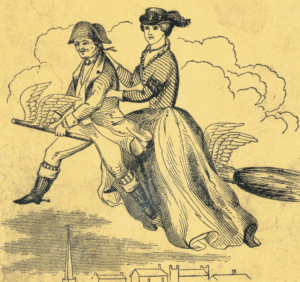For much of the 19th century there was no single, universally-recognized version of Santa Claus. Depending on the author or the artist, the magical gift-bringer could be young or old, bearded or not, tiny, half-sized, adult-sized or gigantic. His clothes could be those of a pedlar, a farmer, Robin Hood, a king, or a Chinese mandarin.
Truly one-of-a-kind is the character trying to pass himself off as St Nick in Santa Claus and Jenny Lind, likely a promotional piece for the P.T. Barnum-sponsored tour of America in 1850 by the Swedish Nightingale. For this book Santa Claus has dressed up as George Washington (presumably to associate himself with patriotic impulses) complete with eighteenth-century bicorn hat, pigtail and spurs on his boots, and sits astride a winged broom piloting a soprano through the skies singing: “I’m a jolly old man – I ride the wind; / The lady behind me is Miss Jenny Lind;/ The horse that we ride is a broomstick, you see –/ Oh! This is the horse for Miss Jenny and me.”
So much about this Santa Claus is different from his rivals: he carries no sack and all his toys emerge from his pockets; he is a clean-shaven, full-sized gentleman of late-middle years with nothing Dutch, elfin or fur-clad about him; he goes through the world during the hours of daylight and instead of waiting for Christmas Eve to reward the good behaviour he finds, he disburses his praises and gifts then and there. His behaviour is neither solemn nor jolly but rather downright queer – a word he uses several times to describe himself – and if he were to enter a doctor’s office today, he might not escape without a diagnosis of Attention-Deficit/Hyperactivity Disorder. His mental focus seems very weak; on the least impulse he bounds away over the landscape: “I was happy to see such a good little boy,/ And took from my pocket a beautiful toy:/ I shouted and threw it, I couldn’t keep still,/ And then I was off, over valley and hill.” He won’t stay in one place long enough even to hear Jenny Lind sing; he hies himself to a mountain top “where winds whistle bleak,” and confesses, “I am dancing a jig, I am having a freak.”
